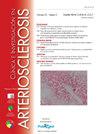El control estricto del colesterol aterogénico en la prevención de las enfermedades cardiovasculares
IF 1.9
Q3 PERIPHERAL VASCULAR DISEASE
引用次数: 0
Abstract
The role of cholesterol associated to low density lipoproteins (LDL) as a causal agent of arteriosclerosis is scientifically consolidated. A number of seminal clinical trials of the highest scientific quality (randomized, controlled, double-blind versus placebo) in the last 40 years have confirmed that lipid lowering therapy with progressively ambitious therapeutic goals is associated with reductions in cardiovascular complications in the absence of major side effects at least up to the range of 30 mg/dL of LDL cholesterol. Drugs that have demonstrated these effects act by reducing circulating LDL cholesterol by upregulating the LDL receptor, independently of their primary action: inhibition of synthesis (statins, bempedoic acid), or absorption of cholesterol (ezetimibe) and promoting recycling of the LDL receptor via proprotein conversin subtilisine kexin 9 blockade. The early reduction of LDL cholesterol and its maintenance over time reinforce the protective effect of these drugs. Additional efforts are needed to improve the LDL control of high-risk patients to reduce their cardiovascular complications.
严格控制致动脉粥样硬化胆固醇,预防心血管疾病。
与低密度脂蛋白(LDL)相关的胆固醇作为动脉硬化的诱因的作用在科学上得到了巩固。在过去的40年里,许多具有最高科学质量的重要临床试验(随机、对照、双盲与安慰剂对照)已经证实,具有逐步雄心治疗目标的降脂治疗与心血管并发症的减少有关,至少在LDL胆固醇30mg/dL范围内没有主要副作用。已经证明这些作用的药物通过提高LDL受体来降低循环中的LDL胆固醇,而独立于它们的主要作用:抑制合成(他汀类药物,苯戊酸),或胆固醇的吸收(依折替米贝),并通过蛋白转化素subtilisine kexin 9阻断促进LDL受体的再循环。低密度脂蛋白胆固醇的早期降低及其随时间的维持加强了这些药物的保护作用。需要进一步努力改善高危患者的LDL控制,以减少其心血管并发症。
本文章由计算机程序翻译,如有差异,请以英文原文为准。
求助全文
约1分钟内获得全文
求助全文
来源期刊

Clinica e Investigacion en Arteriosclerosis
PERIPHERAL VASCULAR DISEASE-
CiteScore
3.20
自引率
6.20%
发文量
44
审稿时长
40 days
期刊介绍:
La publicación idónea para acceder tanto a los últimos originales de investigación como a formación médica continuada sobre la arteriosclerosis y su etiología, epidemiología, fisiopatología, diagnóstico y tratamiento. Además, es la publicación oficial de la Sociedad Española de Arteriosclerosis.
 求助内容:
求助内容: 应助结果提醒方式:
应助结果提醒方式:


